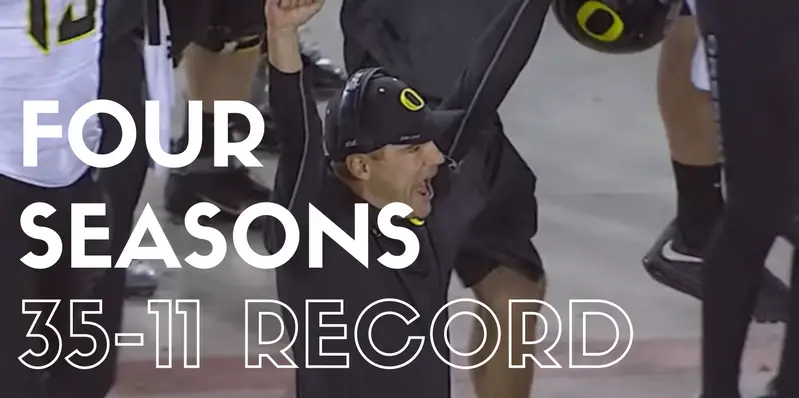Is this season a lost cause? Many fans are already asking the question, just five games into a 12-game season. The struggles have been well documented. The defense not getting any consistent pressure, the linebackers out of position, missed tackles at every level. The offense humming one minute, then pedestrian the next. Repeated attempts to run up the middle despite the Ducks’ inexperienced line, many tackles for loss. Calls for the coach’s heads, legs and arms abound.
In my first article this season was titled Hope, Expectations, and the 2016 Oregon Ducks, I concluded with my hope was not in the offense but in the defense, that it would: “disrupt instead of react, apply constant and constantly-changing pressure, dictate the tempo, the time of possession and the score.” I concluded the article with:
“My hope this season is that regardless of what happens on the offensive side of the ball, the defensive side finds greatness, and through that the team finds greatness, and that once again our collective hope and expectations will reach yet even greater heights.”
After watching five games I can tell you that the hope I wrote of above has evaporated, and I have no expectations of greatness, this season.
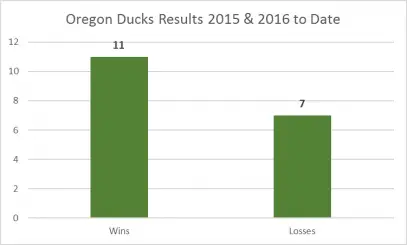
Normally the difference in height of these columns is much greater.
But I don’t believe this season is a lost cause and I still have hope. In my article last week, I predicted a 6-6 season, which included the assumption they’d beat WSU. Despite that loss I still think the Ducks can win three more games and end up 5-7. Now, that would mean the Ducks first losing season since 2004, the Ducks first season without nine wins in ten years, and the first season in ten years where the Ducks won’t end up ranked in the AP Top 25.
Those are three very large and bitter pills to swallow. The Ducks have been at or near the top of the college football landscape for nine straight years and this is apparently the year it all comes crashing down.
You’re probably thinking: so then how is this season not a lost cause and how does this Ducks fan still have hope? It’s not a lost cause for two simple reasons. First, the Ducks can still win games, they’re not destined for 2-10. The Pac-12 is not so strong that with the Ducks defense and young offensive line they can’t notch some wins. Several other teams in the Pac-12 are in the same boat: good offense, weak defense. Those are teams the Ducks can beat, and wins are something you can build upon.
Second, in terms of getting better, nothing compares to live game snaps and then watching yourself on film. It’s a fact that you improve faster when the competition is harder. Given how several Pac-12 teams and their players are markedly better than the Ducks right now, that points to a lot of opportunity for the Ducks players to improve quickly.

There is always light at the end of the tunnel … if you go far enough
And that, my friends, is the proverbial light at the end of this dark tunnel we’re all in right now. That is where the hope lies. In the future, in improvement, in next season. A lot of people hate the saying “It’s about the journey, not the destination,” but all we have right now is the journey, however difficult it may be.
Due to recruiting and injuries the Ducks are starting four red-shirt freshman offensive linemen. No other team in the Pac-12 is starting even a single freshmen on the offensive line, and for good reason. It’s a position that probably requires more reps to master than any other. You have to perform at your peak both physically and mentally on every single play and there are something like 150 different plays. So the Ducks offense has and will continue to struggle this year. The blocking is inconsistent, the zone-read ineffectual, the pressure on the quarterback frequent.
But it also means that by the end of this season the Ducks are going to have four pretty good offensive linemen with three years of eligibility left, giving them consistently high performance along the line through 2019. Marcus Mariota is touted as a once in a lifetime talent, and he was, but recall he had a good or great offensive line in front of him pretty much the entire time he was here. It makes a huge difference in every aspect of the offense, especially Oregon’s.
The defense … where to begin.
When switching to a 4-3 you are always always going to have personnel problems. You’ve been recruiting for one system and now you have to not only teach guys a new system, but you don’t necessarily have the stable of bodies you need for the 4-3.
Recruiting is another issue. The Ducks have had some marquee talent on the defensive line for several years now, but not anymore, and it shows. They’re rarely getting pressure on the opposing quarterback, even when the Ducks blitz, and certainly not when the Ducks drop eight or nine guys, a call that Brady Hoke seems to have a proclivity toward.
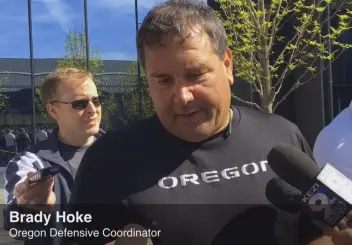
Given time and the right type of players the defense should improve, but is there enough time?
There are times when the Duck linebackers seem completely lost, and plays where I struggle to find them on the field at all. They’ve had injuries, guys are young, but this seems bigger than that. I can’t help but wonder if it relates to Don Pellum’s coaching ability. He’s been the linebacker coach forever, outside his stint as defensive coordinator, but perhaps the switch to 4-3 hasn’t been easy for him to coach.
Still, despite all of these challenges there is really nowhere to go but up. The defense can hardly get worse, and similar to the offensive line they will get better as the season goes by and they spend more time in the 4-3 system. The Ducks do apparently have a decent secondary, which is something to build upon, but right now they are being asked to cover Pac-12 offenses and make the tackles on running plays. They simply can’t be everywhere at once.
In any case, despite the level of vitriol coming out of Ducks Nation, the coaching staff isn’t going to change any time soon. Rich Brooks was the coach from 1977-1994. During those 17 years nine were losing seasons, two were 6-6, and only six were winning seasons. Mike Bellotti was coach from 1995 to 2008. During his 13-year tenure he had only one losing season, 2004. There were however some lean years, including 6-5 in 1996, 7-5 in 1997, 7-6 in 2002, and 7-6 in 2006. Regardless, the expectations from the Brooks era to the Bellotti era changed dramatically.
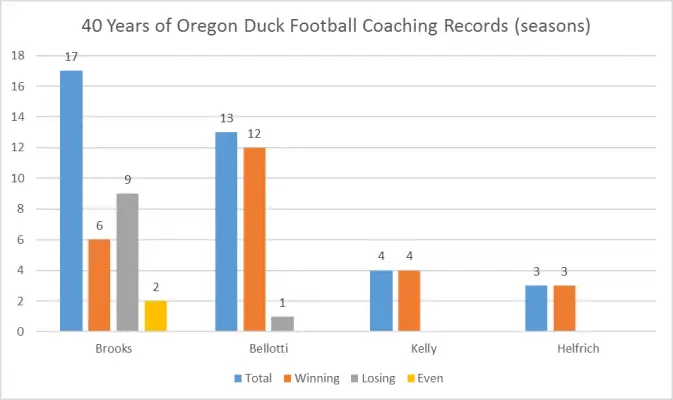
Duck fans have been accustomed to at least winning seasons for a very very long time.
Oregon fans expected a winning season every year at a minimum. Chip Kelly took the expectations into the stratosphere with a 44-6 record over four years. Mark Helfrich largely sustained that with a 33-8 record over his first three years, with wins in the Alamo Bowl in 2013 and Rose Bowl in 2014. Last year the team struggled greatly when Vernon Adams was out, culminating with humiliation in the Alamo Bowl against TCU.
This really kick started the rhetoric regarding the coaching staff. Why was the defense nearly the worst in the country? Why couldn’t the Ducks hold a 30-point lead at half-time against a much weaker team? Why hadn’t the Ducks been developing quarterbacks from within?
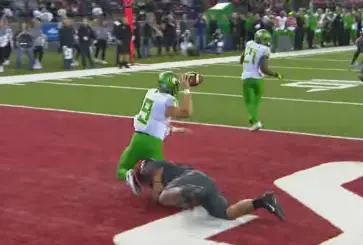
Prukop isn’t the scrambler like Mariota and Adams, but can Herbert do better behind a young line?
The start to this season has led to calls for wholesale coaching changes, but it isn’t going to happen. Helfrich would have to oversee 2-3 losing seasons in a row to be fired and if the defense continues to struggle he might be able to bail water by firing Hoke, lengthening his own tenure.
Coaching changes rarely, if ever, result in more wins. Typically, it takes programs 2-3 years to see the results of a top-tier coach, of which there are few on the market each year.
So if you are putting your hope in a coaching change after this season you will be disappointed. Instead hope in a more experienced offensive line, a quarterback (Justin Herbert?) behind them who’s developed from within the program, a continued pool of fast and skilled running backs and receivers, and a defense that has more maturity, fewer injuries and understands the 4-3 well enough to play like it.
Disclaimer: Readers: Every writer on FishDuck.com is allowed to express their opinion in their articles. However, articles do not represent the views of the other writers, editors, coaching consultants, management, or the principals of FishDuck.com Charles Fischer
Top photo credit: from Video
Related Articles:
Why Oregon Football Always Belongs in the National Conversation
The B1G Won the 2026 Coaching Carousel...Big-Time!
Continuity? Lanning's Hiring Success is Put to the Test
Why Whether Dyer Was Down or Not...Doesn't Matter
How to Analyze Football Talent Like a Pro
Some Thoughts as the Football Withdrawals Kick In
David, a father of two young Oregon fans, has been a Duck all his life after growing up in Eugene. Although not UO Alumni, his wife was a Journalism major there, and he has stayed true to his Ducks wherever life has taken him. In addition to watching the Ducks each Saturday with up to 200 fans at the Irish Channel in Washington, D.C., he has enjoyed playing tackle football with friends each fall for 25 consecutive years, regularly implementing the latest Oregon offensive wrinkle to stymie defenses. David has been writing short stories all of his adult life for fun and is excited to be writing about the Ducks on Fishduck.com.

